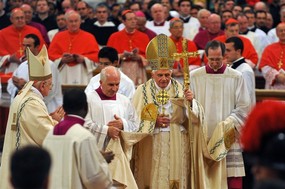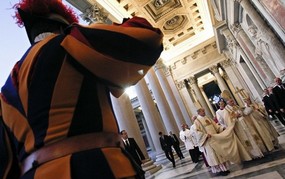The Pope’s homily for Vespers at the Basilica of Saint Paul’s Outside the Walls for the feast of the Conversion of Saint Paul and the closing of Week of Prayer for Christian Unity. A video clip of the event.
Following the
example of Jesus, who on the eve of his Passion prayed to the Father for his
disciples “that they may all be one” (John 17:21), Christians
continue to invoke incessantly from God the gift of this unity. This request is
made more intense during the Week of Prayer, which ends today, when the
Churches and ecclesial Communities meditate and pray together for the unity of
all Christians.
This year the theme offered for our meditation was proposed by
the Christian communities of Jerusalem, to which I would like to express by heartfelt
gratitude, accompanied by the assurance of affection and prayer either on my
part or on that of the whole of the Church. The Christians of the Holy City
invite us to renew and
reinforce our commitment for the re-establishment of full unity meditating on the model of life of the first disciples of Christ gathered in Jerusalem: “They — we read in the Acts of the Apostles (and we heard it now) — devoted themselves to the Apostles’ teaching and fellowship, to the breaking of bread and the prayers” (Acts 2:42). This is the portrait of the early community, born in Jerusalem the same day of Pentecost, aroused by the preaching of the Apostle Peter, full of the Holy Spirit, addressed to all those who had arrived in the Holy City for the feast. A community not shut-in on itself, but, from its birth, catholic, universal, capable of embracing people of different languages and cultures, as the book of the Acts of the Apostles itself testifies. A community not founded on a pact among its members, or the simple sharing of a project or an ideal, but from profound communion with God, who revealed himself in his Son, from the encounter with Christ dead and resurrected.
n a brief summary, which ends the chapter that began with the account of the descent of the Holy Spirit on the day of Pentecost, the Evangelist Luke presents synthetically the life of this first community: how many had heard the word preached by Peter and were baptized, listened to the Word of God, transmitted by the Apostles; were happily together, taking charge of the necessary services and sharing freely and generously their material goods; celebrated the sacrifice of Christ on the Cross, his mystery of Death and Resurrection, in the Eucharist, repeating the gesture of the breaking of the bread; they continually praised and thanked the Lord, invoking his help in their difficulties. This description, however, is not simply a memory of the past, and even less the presentation of an example to imitate or of an ideal goal to reach. It is rather the affirmation of the presence and action of the Holy Spirit, uniting all in Christ, who is the principle of the unity of the Church and makes believers one.
The teaching of the Apostles, fraternal communion, the breaking of the bread and prayer are the concrete ways of life of the first Christian community of Jerusalem gathered by the action of the Holy Spirit but at the same time they constitute the essential features of all Christian communities, of all times and all places. In other words, we can also say that they represent the essential dimensions of the unity of the visible Body of the Church.
We must be grateful because, in the course of the last decades, the ecumenical movement, “arising from the impulse of the grace of the Holy Spirit” (Unitatis Redintegratio, No. 1), has taken significant steps forward, which have made it possible to attain encouraging convergence and consent on varied points, developing between the Churches and the ecclesial communities relations of mutual esteem and respect, as well as of concrete collaboration in face of the challenges of the contemporary world. We are well aware, however, that we are still far from that unity for which Christ prayed and which we find reflected in the portrait of the first community of Jerusalem. The unity to which Christ, through his Spirit, calls the Church is not realized only on the plane of organizational structures, but is configured, at a much more profound level, as expressed “in the confession of only one faith, in the common celebration of divine worship and in the fraternal concord of the family of God” (ibid., No. 2).
The search for the re-establishment of unity among divided Christians cannot therefore be reduced to a recognition of the reciprocal differences and to the obtaining of a peaceful coexistence: What we long for is that unity for which Christ himself prayed and which by its nature is manifested in the communion of the faith, of the sacraments, of the ministry. The path toward this unity must be seen as a moral imperative, response to a precise call of the Lord. Because of this, the temptation must be overcome to resignation and pessimism, which is lack of trust in the power of the Holy Spirit. Our duty is to continue passionately on the path towards this goal with a serious and rigorous dialogue to deepen the common theological, liturgical and spiritual patrimony; with reciprocal knowledge, with the ecumenical formation of the new generations and, above all, with conversion of heart and prayer. In fact, as Vatican Council II declared, the “holy intention to reconcile all Christians in the unity of the one Church of Christ, surpasses human forces and talents” and, because of this, our hope is placed first of all “in the prayer of Christ for the Church, in the Father’s love for us and in the power of the Holy Spirit” (ibid., No. 24).
On this path for the search of full visible unity among all Christians we are accompanied and sustained by the Apostle Paul, of whom today we celebrate solemnly the feast of his conversion. He, before the Risen One appeared to him on the road to Damascus saying to him: “I am Jesus whom you are persecuting!” (Acts 9:5), was one of the most ferocious adversaries of the early Christian communities. The evangelist Luke describes Saul among those who approved the killing of Stephen, in the days when a violent persecution broke out against Christians of Jerusalem (cf. Acts 8:1). He left from the Holy City to extend the persecution of Christians to Syria and, after his conversion, he returned to be introduced to the Apostles of Barnabas, who made himself guarantor of the authenticity of his encounter with the Lord. From then on Paul was admitted not only as a member of the Church but also as preacher of the Gospel together wi
th the other Apostles, having received, as them, the manifestation of the Risen Lord and the special call to be “chosen instrument” to carry his name before the Gentiles (cf. Acts 9:15).
In his long missionary journeys, Paul, journeying through different cities and regions, never forgot the bond of communion with the Church of Jerusalem. The collection in favor of Christians of that community, who, very soon, had need of being helped (cf. 1 Corinthians 16:1), occupied an important place in Paul’s concerns, which he considered not only a work of charity, but the sign and the guarantee of the unity and the communion between the Churches founded by him and the early community of the Holy City, as sign of the one Church of Christ.
In this climate of intense prayer, I wish to address my cordial greeting to all those present: to Cardinal Francesco Monterisi, archpriest of this Basilica, to Cardinal Kurt Koch, president of the Pontifical Council for Promoting Christian Unity, to the other cardinals and brothers in the episcopate and priesthood, to the abbot and to the Benedictine monks of this ancient community, to men and women religious, to the laity that represent the entire diocesan community of Rome. In a special way, I would like to greet the brothers and sisters of the other Churches and ecclesial communities represented here this evening. Among them, it is particularly gratifying to me to address my greeting to the members of the International Mixed Commission for Theological Dialogue between the Catholic Church and the Ancient Eastern Churches, whose meeting will take place here in Rome in the next few days. Let us entrust to the Lord the good outcome of your meeting, so that it can represent a step forward toward the much hoped for unity.
Dear brothers and sisters, trusting in the intercession of the Virgin Mary, Mother of Christ and Mother of the Church, we invoke, therefore, the gift of unity. United to Mary, who on the day of Pentecost was present in the Cenacle together with the Apostles, we turn to God source of every gift to have renewed for us today the miracle of Pentecost and, guided by the Holy Spirit, may all Christians re-establish full unity in Christ. Amen.

